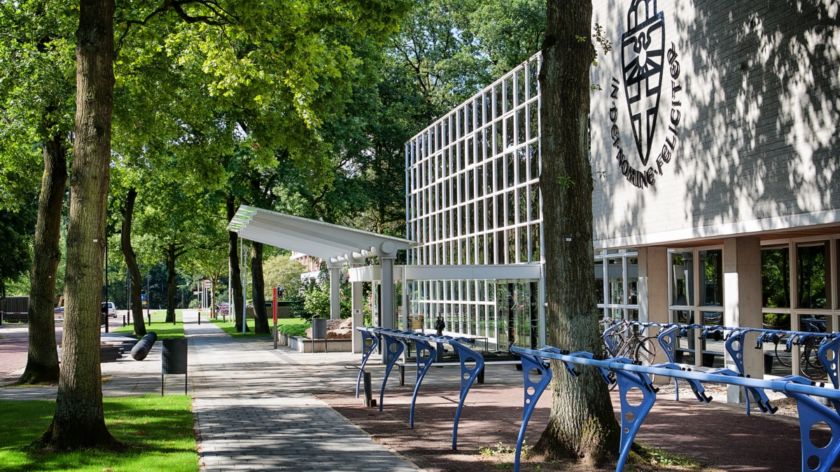Voting for student representation: asap or AKKUraatd?
-
 De Aula. Foto: Dick van Aalst
De Aula. Foto: Dick van Aalst
This week, students can vote for student representation at university level, faculty level and in their study programmes. The two parties to choose from are AKKUraatd and asap. But what do they stand for?
As a student at Radboud University, you can vote for two parties: asap and AKKUraatd. In the current student council, both parties have four seats. The students have meetings with the works council every three weeks, and voice the interests of students with the university board.
A week ago, AKKUraatd stated that it no longer wants to work together with asap and the representatives of umbrella organisations on all issues anymore. According to them, a student faction should be allowed to fight for its own ideals without the obligation to work together, like in a city council.
Asap and the umbrella organisations have a different priority: a council that strives for an open collaboration, based on trust. ‘That does not mean we think finding consensus is a goal in itself, but that we want to use everybody’s expertise’, Xander van Ulsen of asap says.

AKKUraatd
Physics and Astronomy student Bart Zonneveld leads the AKKUraatd list during the upcoming student elections. With the recent break between asap and AKKUraatd, he faces a big challenge. ‘I think that the conflict in the student council is not as bad as it looks’, he says.
‘We think think that it’s weird that an umbrella association like Cultuur op de Campus joins in the conversation about the Binding Study Advice. You can talk about that in a calm manner.’ Zonneveld adds that the umbrella associations would benefit from a different system as well. ‘We should come up with a construction where they only have to discuss the topics that are relevant to them. When we discuss culture venues, the opinion of Cultuur op de Campus should be leading.’
But the umbrella associations were not the main reason to end the collaboration. ‘It went wrong on a more personal level, a breach of trust between the different groups in the student council that did involve the umbrella associations. That breach has not been dicussed well. Unfortunately, we saw no other option than to quit. Next year, we can do better, if we take the time to talk about it.’
‘We are leading in the field of sustainability’
Zonneveld says that all topics in the party programme are important, but especially the wish to make paying per study point possible. ‘There are big groups of managers, caregivers or people who have to work next to their studies who choose not to take sixty study point per year. They only use part of the facilities, but pay the full price. That’s why I want to make it possible to pay per study point.’
According to him, the university board sees that the current system is unfair. ‘I want to investigate why the board does not participate in tests to pay per study point, like other universities do. We can see how the others are doing it, so we can prevent problems in advance. That way, we approach our goal step by step. It does not have to happen next month, if necessary, it can also be in two years.’
Other important points for Zonneveld are making the Honours Academy more accessible and sustainability. ‘We are leading in the field of sustainability. We have been fighting for that since we were founded, even before this was a national theme. In the past few years, asap also sees the value in that, but AKKUraatd is still the strongest in that field.

asap
Asap leader Thom Teulings says that asap still wants to work together with other parties in the student council. ‘It is important that students can form one front opposite the executive board and the works council. We do not have to compromise on every case, but if possible we supplement each other,’ he says. ‘Asap stands for a powerful representation where collaboration, constructiveness and trust are important. A few years ago there was already a discussion about the position of umbrella associations in the student council. All parties involved, including AKKUraatd, saw the value of the umbrella associations back then.’
The most important challenge for the university, according to Teulings, is the balance between student’s studies and their free time. ‘In their studies, a lot is expected of students, but they also want more and more personal development. The programme is not made for that, he says. We need a culture shift: students need to be in charge of their own study strategy.’
‘Students want more and more personal development’
For that, he first of all wants to expand the pilot on flexible studying. ‘More students should have the possibility to be more flexible with the rules. We want to get rid of schoolish measures. No more obligatory attendance and weblectures should be available online. When students can’t make it because of sickness or another reason, they should be able to watch the lecture online.’
Teulings chose asap because he wants transparency and clarity, he says. ‘Our party programme consists of ten bullet points for which we can be held accountable next year. On top of that, we fight for the interest of active students: not just for members of student representation, but students with their own business, or professional athletes, caregivers and students who work next to their studies.’



